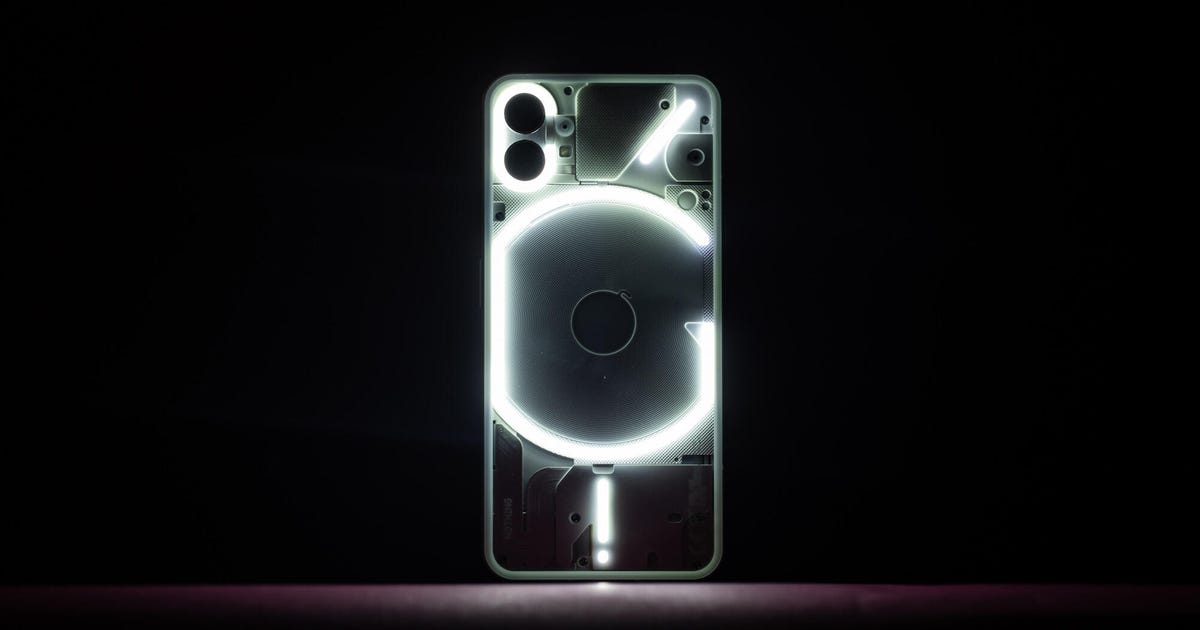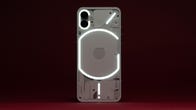There’s a lot of hype surrounding the Nothing Phone 1 launch, especially considering its midrange price. But there are valid reasons for the fanfare. The Phone 1 is Carl Pei’s first phone launch since his departure from OnePlus, which he led from a startup beloved by serious Android fans to a global purveyor of world-class phones.
Nothing says it’s sold more than half a million pairs of its Ear 1 earbuds, its first consumer tech product, since its launch last August. And Nothing counts a glittering group of backers — including iPod co-inventor Tony Fadell, Twitch co-founder Kevin Lin and GV, formerly Google Ventures — all betting Pei can create a big something out of his curiously named company.
The Phone 1, which is available in both black and white, went up for sale today, July 12. It’s slated for a global release, hitting distributors across the world including the UK, Germany, India and Hong Kong. There’s currently no plan for a US release, a spokesperson for the company said.
While pricing varies across markets, the Phone 1, starts at approximately $475 for the base 8GB RAM, 128GB storage variant and maxes out at about $590 for the 12GB RAM, 256GB storage variant after converting from international prices. With this price range, the Phone 1 is up against the iPhone SE 2022, the Google Pixel 6 and the Samsung Galaxy S21 FE, among others. You can also scroll down to the bottom of this page for a side-by-side specs comparison, but make sure to check out our hands-on video of Phone 1 to glean first-hand insights of the device.
The Phone 1 includes a 6.55-inch OLED display, a dual-camera module, a fast-enough processor, a large battery with wireless charging and reverse charging. It also has an in-box charger, a feature that’s increasingly uncommon even in premium phones. But one thing is obvious: The lion’s share of Nothing’s budget went towards design, although it may not be entirely unique considering the Phone 1’s design, which echoes the iPhone’s flat sides and rounded edges.
In an industry first, the Phone 1 has a transparent back panel, which gives you a peek of the device’s components, including the camera, wireless charging coil and USB-C port. Procuring components that look good and function well under a transparent cover required meticulous customisation of components as well as rigorous testing, the company said. Rival manufacturer Xiaomi tried to create its own phone with a transparent design in the past, but its version used dummy components to mask the real ones.
The back of the Phone 1 is also home to the so-called “glyph” interface, the device’s standout feature. The back of the phone literally lights up, thanks to hundreds of LED lights, which can be customized to tell you who is calling or indicate charging status. Given the design costs, Nothing said it was forced to make some tradeoffs to bring the Phone 1 to fruition at its targeted price. One of those is the chipset, which is the Snapdragon 778G Plus instead of the latest Snapdragon 8 Gen 1 processors. The company said it chose the midrange Qualcomm chipset because it’s tried, tested and it “doesn’t overheat.”
The Phone 1 may not be as durable as some of its peers. Its IP53 rating is less than the IP67 rating of the similarly priced iPhone SE 2022, for example. The former rating means Phone 1 is protected against dust, and light sprays of water, but it is hardly waterproof. In other words, you’ll be fine if you’re caught in a light shower with this phone, but you shouldn’t go running in the rain with it. Dropping it in the sink or toilet is a no-go, and you should definitely not take it anywhere near a pool.
To learn more about how Phone 1 stacks up against competitor phones, take a look at CNET’s specs chart below.
Nothing 1 vs. competitors
| Nothing Phone 1 | Apple iPhone SE (2022) | Google Pixel 6 | Samsung Galaxy S21 FE | iPhone 13 | |
|---|---|---|---|---|---|
| Display size, resolution | 6.55-inch OLED display, 2,400×1,080 pixels | 4.7-inch LCD; 1,334×750 pixels; 60Hz | 6.4-inch OLED; 2,400×1,080 pixels; 60 or 90Hz | 6.4-inch AMOLED screen; Full HD Plus resolution; 2,340×1,080 pixels; 120Hz | 6.1-inch OLED; 2,532×1,170 pixels |
| Pixel density | 402ppi | 326ppi | 411 ppi | 460 ppi | |
| Dimensions (Millimeters) | 159.2 x 75.8 x 8.3 mm | 138.4 x 67.3 x 7.3 mm | 158.6 x 74.8 x 8.9 mm | 74.5 x 155.7 x 7.9 mm | 147 x 72 x 7.65 mm |
| Weight (Ounces, Grams) | 193.5 grams | 5.09 oz; 144 grams | 7.3 oz; 207 grams | 177 grams | 6.14 oz; 174 grams |
| Mobile software | Android 12 | iOS 15 | Android 12 | Android 11 | iOS 15 |
| Camera | 50-megapixel (main), 50-megapixel (ultra-wide) | 12-megapixel (wide) | 50-megapixel (wide), 12-megapixel ultrawide | 12-megapixel (main), 12-megapixel (ultra-wide), 8-megapixel (telephoto) | 12-megapixel (wide), 12-megapixel (ultrawide) |
| Front-facing camera | 16-megapixel | 7-megapixel | 8-megapixel | 32-megapixel | 12-megapixel |
| Video capture | 4K at 60fps | 4K | 4K | ||
| Processor | Snapdragon 778G Plus | Apple A15 Bionic | Google Tensor | Snapdragon 888 (in the US) | Apple A15 Bionic |
| Storage and RAM | 128GB storage, 8GB RAM; 256 GB, 8GB RAM; 256GB, 12GB RAM | 64GB, 128GB, 256GB | 128GB, 256GB | 128GB, 6GB RAM; 256GB, 8GB RAM | 128GB, 256GB, 512GB |
| Expandable storage | None | None | None | None | None |
| Battery/Charger | 4,500 mAh (33-watt wired charging, 15W wireless charging, 5W reverse charging) | Battery sized not disclosed (charger not included; supports wireless charging) | 4,614 mAh | 4,500 mAh (no bundled charger) | Undisclosed; Apple lists 19 hours of video playback |
| Fingerprint sensor | In-display | Under display | In-display | No | |
| Connector | USB-C | Lightning | USB-C | USB-C | Lightning |
| Headphone jack | No | None | None | None | No (Face ID) |
| Special features | 5G, IP53, Three years of Android updates, dual SIM, 120Hz adaptive refresh rate | 5G-enabled; supports 25W wired fast charging; water-resistant (IP67); dual-SIM capabilities (nano-SIM and e-SIM); wireless charging | 5G sub 6 (some carrier models also have 5G mmWave) support, Wi-Fi 6E, 30W fast charging, Magic Eraser, Motion mode, Real Tone, Face Unblur, Cinematic Pan, five years’ OS and security updates, IP68 rating for dust and water-resistance, Gorilla Glass Victus (front), Gorilla Glass 6 (back), (nano-SIM and e-SIM) | 5G (Sub-6GHz and mmWave), 120 Hz display, IP68 rating, 25W wired charging, 15W wireless charging | 5G enabled; MagSafe; water-resistant (IP68); wireless charging; dual-SIM capabilities (nano-SIM and e-SIM) |
| Price (USD) | Roughly converted from UK prices: $470 (128GB), $530 (256GB), $600 (256GB) | $399 (64GB), $449 (128GB), $549 (256GB) | $599 (128GB) | $700 (128GB/6GB); $770 (256GB/8GB) | $799 (128GB), $899 (256GB), $1,099 (512GB) |


